Populism or a complex problem — Why are farmers protesting across the EU?

Scattered Ukrainian grain and Moroccan vegetables thrown on the pavement are the actions of farmers protesting across the European Union since the beginning of 2024. They block roads and city squares, clash with police, dump manure at the entrances to supermarkets in France, and do their best to draw attention to their demands from EU governments and the European Commission.
Read about the reasons for the protests and their impact on the economies of the European Union and Ukraine in this article.
Why farmers across the EU are protesting
In 2019, the European Commission introduced the European Green Deal, a strategy for comprehensive biodiversity conservation and climate action across the European Union. The plan is designed to last until 2050 and covers almost all areas of EU policy — climate, energy, finance, transport, industry and agriculture.
In the agricultural sector, the new strategy has influenced changes in livestock farming — farms must reduce greenhouse gas emissions from cattle; food labelling — all nutritional information must now be on the front of the pack; reducing the use of pesticides and switching to organic farming to neutralise the impact of human activity on the climate.
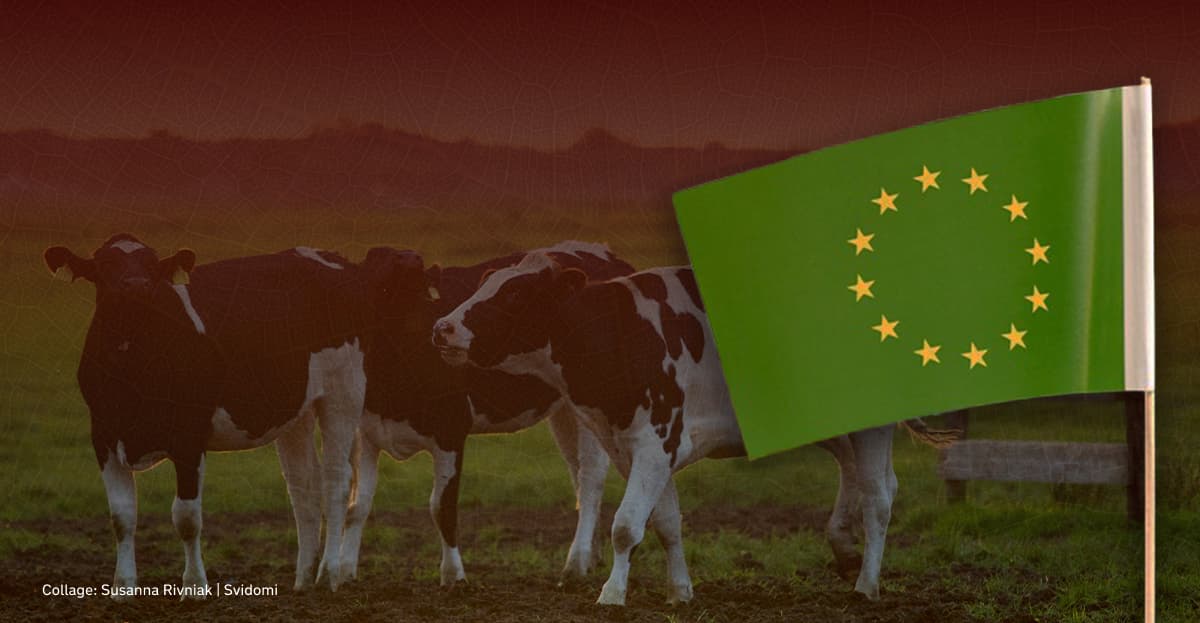
In 2022, the European Commission implemented one of the main parts of the Strategy — restoring the natural environment. The project aims to restore the flora and fauna of seas and rivers, forests and shrubs, marshes, and meadows. In the last point, farmers had to get rid of some of their land for restoration, or at least convert it to organic production to restore the fauna of small insects and butterflies in the meadowlands.
In 2024, the European Parliament will have to approve a law restoring the natural environment. On February 1, the European Council met to discuss this law. Farmers decided to act in defiance, and at that time, they started protests in almost all EU member states, primarily in Strasbourg, the seat of the European Parliament, and in Brussels.
Volodymyr Lapa, Strategic Development Advisor to the President of the Ukrainian Agribusiness Club (UCAB), tells Svidomi that farmers don't oppose the whole Green Deal, just part of it.

“The two main points of the Green Deal that farmers have opposed are increasing the amount of land taken out of production and tightening the ban on chemical pesticides. While the first reduces the income base, the second is a concern in terms of competition with imported products. Not all countries will introduce similar bans simultaneously, which could make imported products more competitive,”
says Volodymyr Lapa.
This is happening against a significant drop in global (and therefore European) prices and the EU's Common Agricultural Policy (budget support) stagnation. Both factors significantly increase tensions between the protesters and the EU.
Protests also broke out in Spain, Greece, Romania and the Czech Republic. In Germany, farmers protested against the abolition of diesel fuel privileges for farms, while in the Netherlands, farmers demanded the abolition of nitrogen emission standards for farms, including livestock farms.
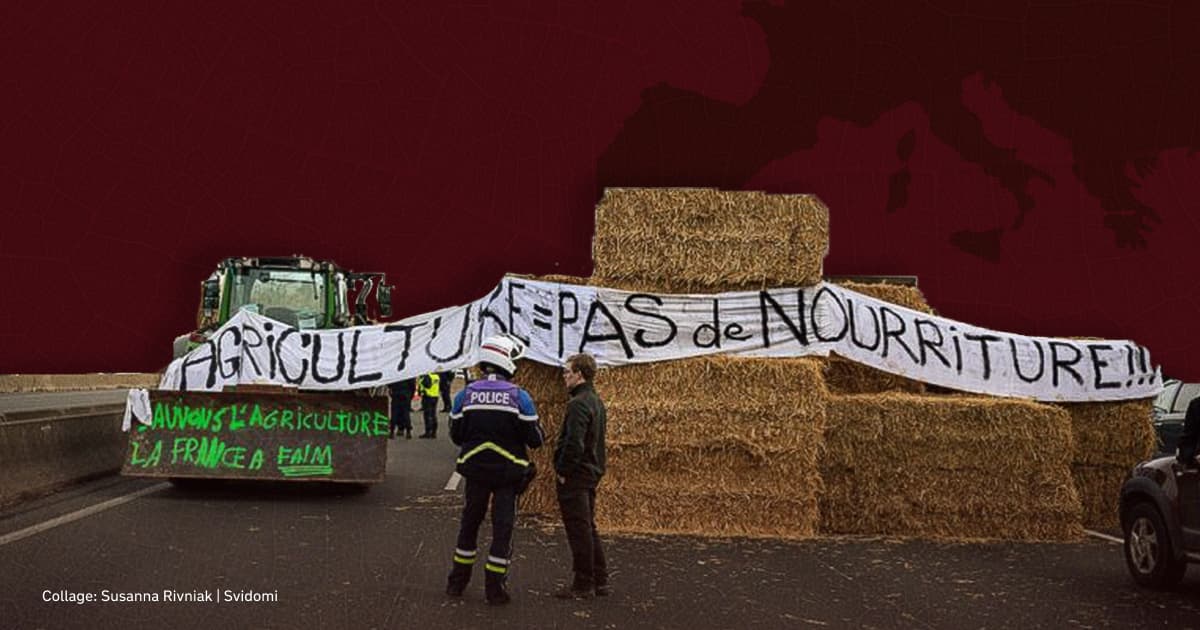
Analysts at the European Policy Centre, Stefan Sipka and Marialena Stagianni, believe that the farmers' protests are partly due to poor communication between European officials and agricultural businesses, especially in the context of the Green Deal strategy.
“With rising inflation and new demands for sustainable development, the EU must take concerns about farmers' livelihoods seriously. The EU needs to assess how it can better use the bloc's budgetary resources to ensure that European agriculture is resilient to crises. At the same time, the EU's agricultural agenda should be fully aligned with the objectives of the Green Deal,” the analysts say in their report on the farmers' protests.
One of the reasons for the protests is competition with agricultural products from third countries. In Poland and Hungary, this was the case with grain imports from Ukraine, and in Spain and France, with fruit and vegetables from Morocco. The peasant organisation La Via Campesina said that farmers “produce food but do not make a living. Because of free trade agreements. Because of deregulation. Because prices are lower than the cost of production”. In their view, the EU's policy of converting farmers to organic production under the CAP and the pesticide requirement forced farmers to raise the price of their products, and they can no longer compete with “cheap products from third countries”.
Spanish farmers accused Morocco of sending low-quality, cheap produce to the Spanish market. Protesters set fire to foreign lorries and destroyed the products they were carrying, including dozens of consignments of tomatoes. In 2023, the EU's imports of vegetables, including tomatoes, from Morocco and Tunisia fell by around a third and remained so until January 2024.
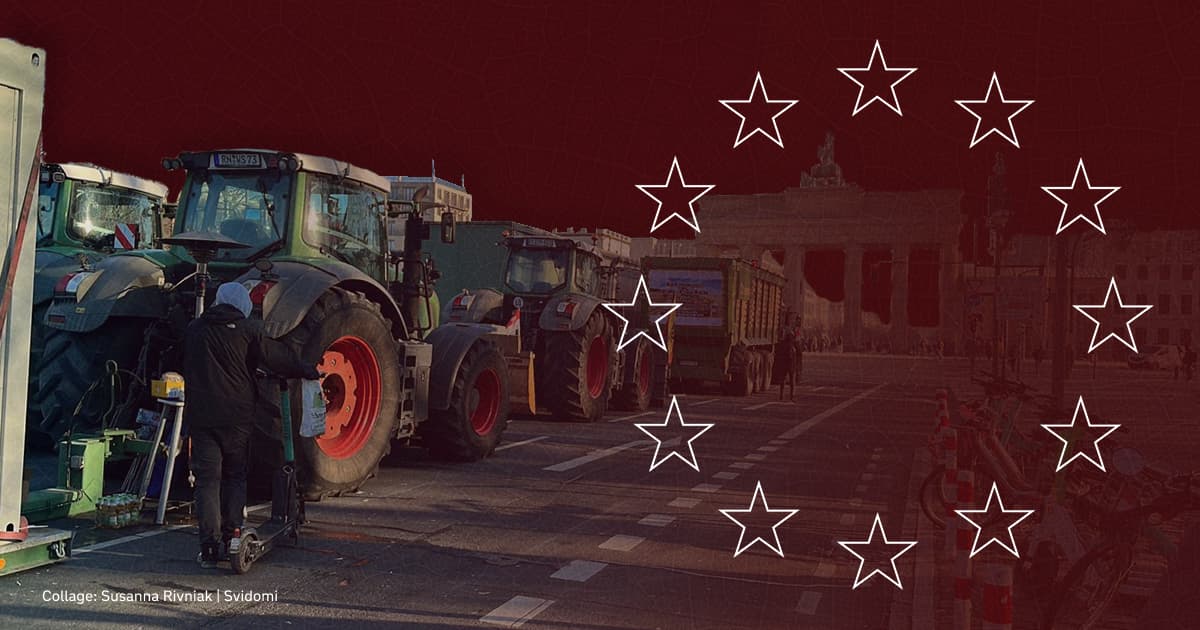
In Romania, the government reached an agreement with farmers to end protests and highway blockades across the country and in the capital, Bucharest, in early February 2024. One of the reasons for the Romanian farmers' protests was the import of Ukrainian grain. The farmers demanded benefits and preferences for their own products. The government agreed to increase subsidies for diesel fuel, abolish high insurance premiums and reduce waiting times at border crossings.
Lighthouse Reports, an international non-profit investigative journalism group, conducted an investigation into the instigators of the protests and found that the European agricultural lobby Copa-Cogeca is using the farmers' protests to slow down EU climate policy. In Denmark, the lobby runs a massive information campaign among farmers to turn them against climate policy.
In Poland, the Copa-Cogeca lobby has united farmers' unions, including the Solidarność group and the Samoobrona trade union, which advocate a complete embargo on products from Ukraine and a blockade of the border. The lobby coordinates trade unions in Poland and conducts information policy in favour of subsidies for farmers and against climate policy. Membership fees are required to participate in the association. Polish farming enterprises often do this with state subsidies. Every year, the Copa-Cogeca lobby receives about PLN four million from Poland for its activities, the independent Polish media outlet Okko.press found together with Lighthouse Reports.
The difference between the Polish protests and their impact on Ukraine
The farmers' protests in Poland have also become controversial. In early February, protesters blocked all checkpoints on the Ukrainian-Polish border, protested in Warsaw and other major cities, and blocked country motorways.
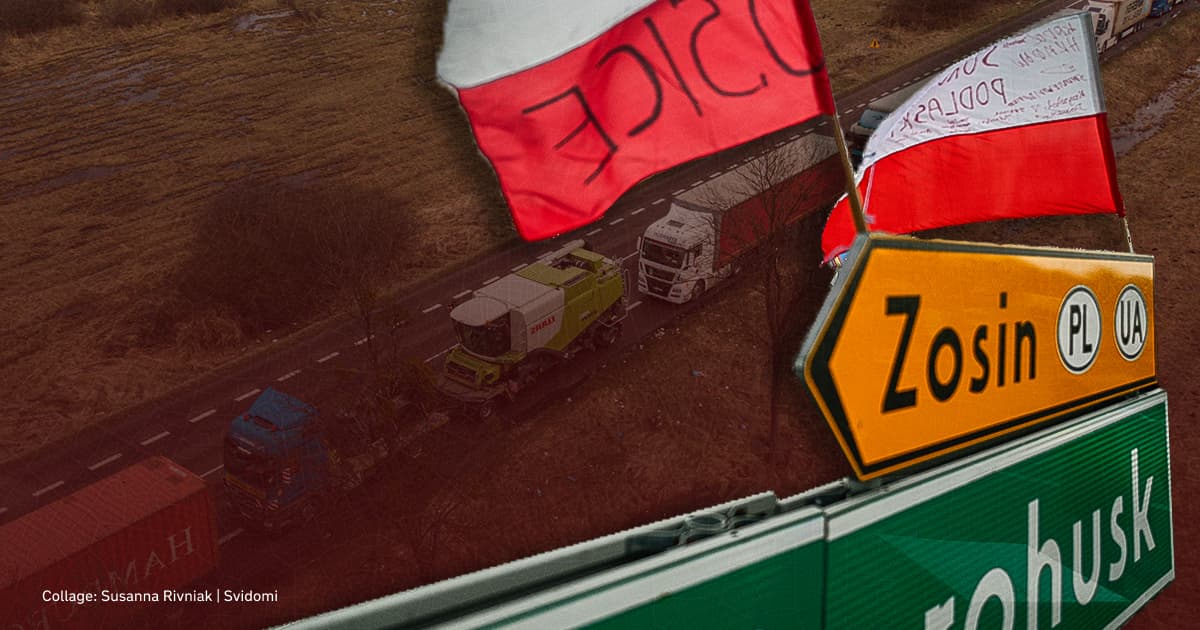
Polish farmers have variously cited the reasons for the protests: firstly, “grain imports from Ukraine”, the European Green Deal, cuts in subsidies and falling grain prices on the world market. Michał Kołodziejczak, Deputy Minister of Agriculture of Poland and head of the AGROunion (Polish: AGROunia) movement, said that farmers “stand for survival, demand decent work and are not interested in subsidies”, including from the European Union.
Polish President Andrzej Duda believes that Russia is to blame for the whole situation with Ukrainian agricultural exports, as the war has forced grain to be transported through European ports, including Polish ones.
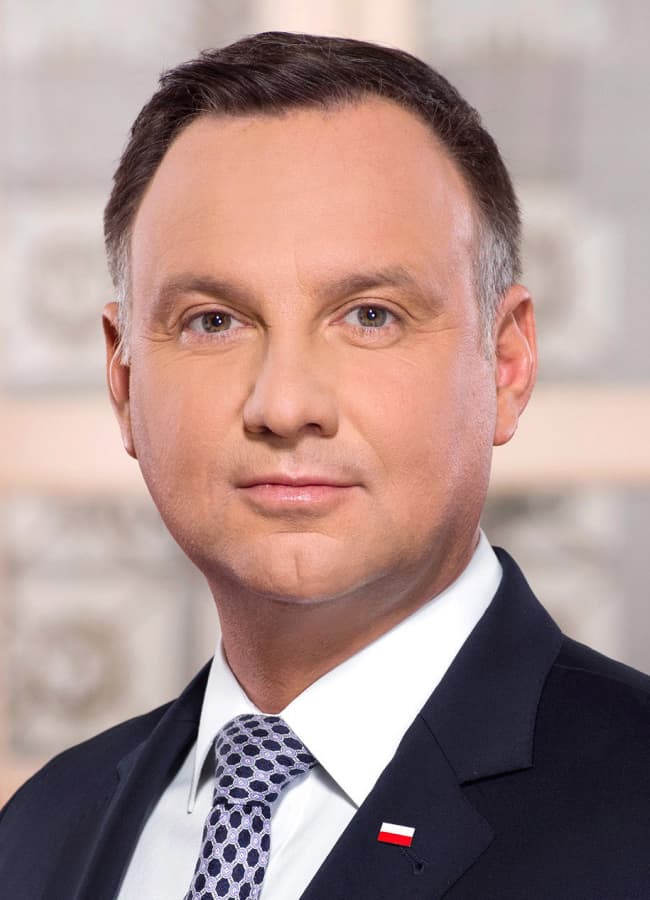
“Farmers fear a huge influx of Ukrainian agricultural products into EU markets. They believe it must be controlled because they fear for their livelihoods. They want the EU to solve this problem at the Brussels level,”
Duda said.
According to RMF FM, most Poles believe that the main reason for the farmers' protests in the country is the European Commission's opening of the EU market for Ukrainian agricultural products — namely, the introduction of the Solidarity Lanes Action Plan in 2022. Because Ukrainian agricultural products, primarily grain, were supplied across the western border, they entered the EU market, including the Polish market.
According to the Polish Central Statistical Office, in 2022, Poland imported more than $2.2 billion worth of agricultural products from Ukraine. In April 2023, Poland imposed an embargo on imports of Ukrainian grain, but it has not yet lifted it. This resulted in a decrease in imports from Ukraine. In 2023, Poland imported half the amount of agricultural products from Ukraine — more than USD 1 billion.
In February 2024, Ukrainska Pravda conducted an investigation into Poland's imports of agricultural products from Belarus and Russia. According to their data, Poland imported $55 million worth of agricultural products from Belarus and $117 million from Russia. After the embargo on Ukrainian agricultural products was imposed in 2023, Poland imported from Belarus the products that the government had banned to import from Ukraine.
To circumvent the sanctions, Polish hauliers load grain in Belarus onto trucks with Polish licence plates and transport it across the border into Poland. In March, the Polish Sejm passed a resolution imposing sanctions on imports of Russian and Belarusian food and agricultural products. Now, it needs to be backed by the government.
Ukraine could only transit through the border with Poland. In February 2024, Oleksandr Kubrakov, the Minister for Restoration of Ukraine, reported that Ukraine had transited about 370,000 tonnes of agricultural products through Poland in January 2024. This represents 5% of Ukraine's total exports. All this is thanks to the opening of the ports of Greater Odesa on the Black Sea and ports on the Danube in 2023, following successful attacks by the Ukrainian Defence Forces on the Russian Black Sea Fleet.
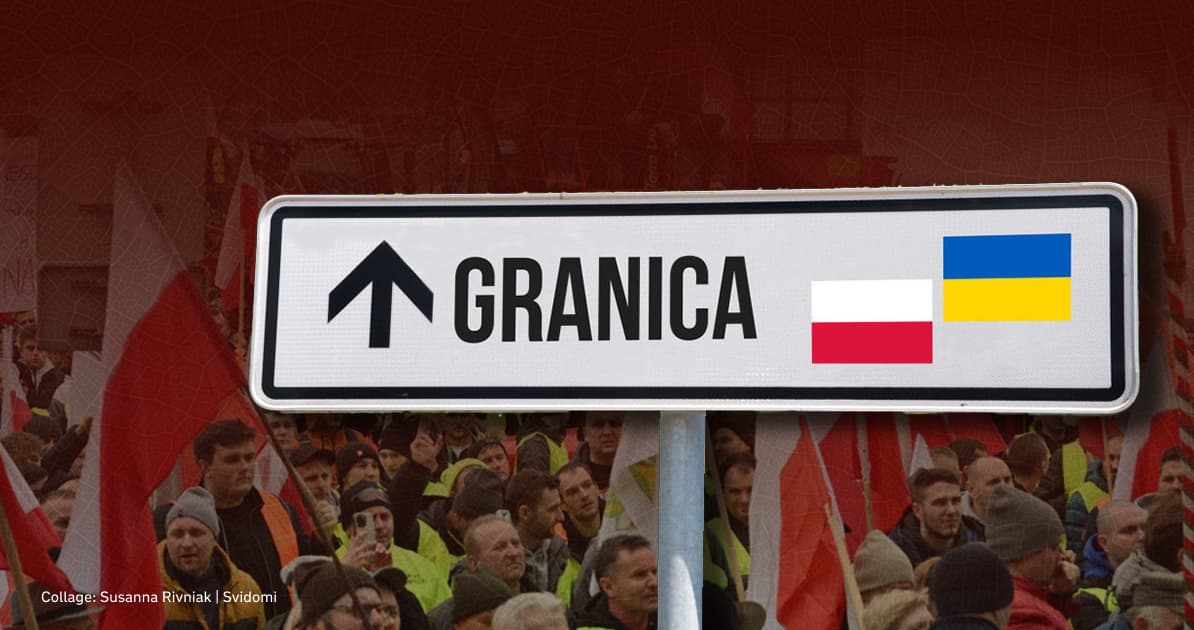
“Thanks to sea transport, exports of agricultural products in January totalled 6.7 million tonnes,” the minister said.
Grain prices are falling worldwide. According to the European Commission, the price of wheat in March 2024 was €219 per tonne. In December 2023, wheat cost €223 per tonne. The price of wheat on the EU market has fallen by about 1.5% per month since January 2023, resulting in a total price drop of more than 25 % in 2023. The EU embargo on certain types of Ukrainian cereals, including wheat, has not stabilised prices on the European market.
However, Polish farmers believe that Ukrainian grain is driving down European agricultural prices, as it is “20% cheaper than Polish grain”, and therefore less of their grain is bought. They used the blockade of the Polish-Ukrainian border to express their protest and also committed acts of vandalism, throwing Ukrainian grain out of trucks and railway wagons. In February, protesters threw about 160 tonnes of maize that Ukraine was exporting to Morocco in transit through Poland.
Roman Matys, a Ukrainian economist and head of the Department for Investment Policy NGO, believes that Poland's embargo on Ukrainian agricultural products should have calmed Polish farmers and partially resolved the problem, but this did not happen. Instead, the border blockade negatively impacts trade between Ukraine and the European Union.

“The blocking of the borders, first by 'carriers' and then by 'farmers', affects not only the export of agricultural products but also the export or import of other goods. Several tens of thousands of trucks with products that have nothing to do with the list of banned products are stuck at the borders. This blocks active trade and money circulation and negatively affects the financial condition of Ukrainian companies,”
Roman Matys said in a comment to Svidomi.
Michał Kołodziejczak, Deputy Minister of Agriculture of Poland, also reported that Ukrainian agricultural products compete with Polish ones in Germany. In an interview, he said that Poland would demand control over the transit of farm products from Ukraine through Poland and a quota for Ukrainian grain on the European market. On February 26, Polish protesters blocked the road between Poland and Germany to prevent the transit of Ukrainian grain to Germany.
Juliusz Zoria is a Polish entrepreneur of Ukrainian origin and managing general partner of Confidence.Trading. He believes that imports of Ukrainian grain to Poland are not a problem for Polish farmers, as grain prices have fallen even after the 2023 embargo.
"Ukrainian grain, grown without subsidies, can organically complement the structure of EU agriculture, help reduce inflation, strengthen the competitiveness of the EU economy in general and EU agriculture in particular. Grain is not only a raw material for the production of flour/bread, cereals, pasta and vegetable oils, but grain is also the main component of animal feed, i.e. the raw material for eggs, meat, milk, all dairy, and meat products,” he said in a comment to Svidomi.
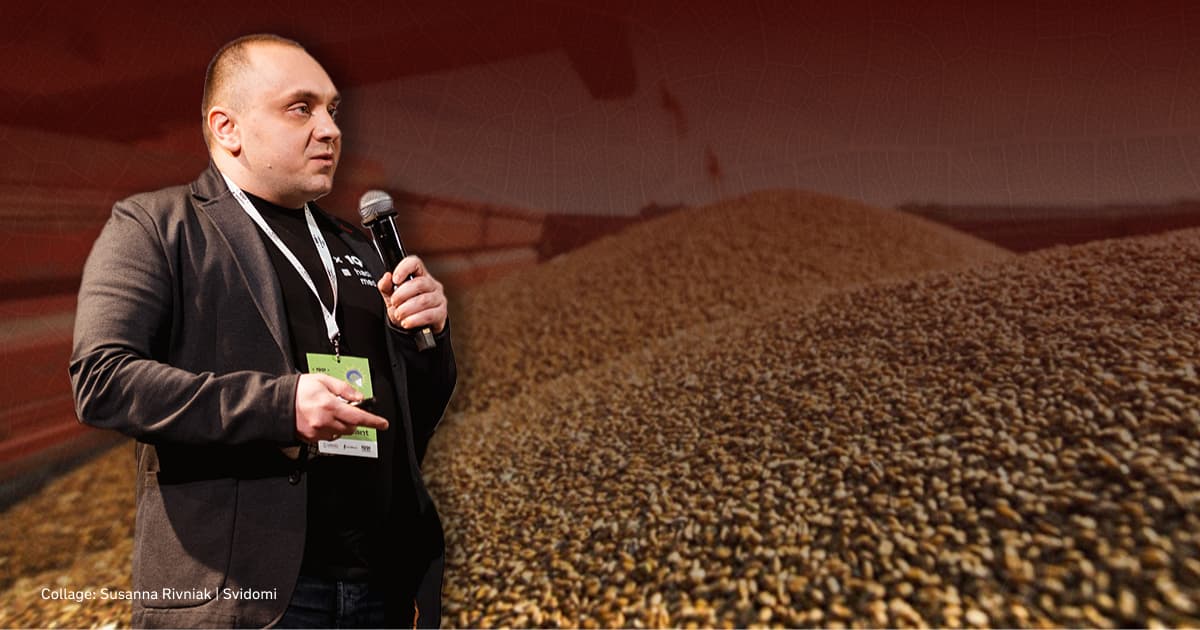
In January, the European Commission proposed extending free trade with Ukraine until June 2025. Commission vice-president Margaritis Schinas said that “monitoring has not shown any negative consequences for the EU market as a whole”. In March, the European Parliament amended the Commission's proposal, and voted to include the limits for "sensitive items for European agricultural producers.”
In March, Polish farmers continued their protest at the Polish-Ukrainian border until the end of April. They are demanding restrictions on agricultural imports from Ukraine.
What the EU offers to solve farmers' problems and how it will affect Ukraine
The European Union is trying to find a compromise with farmers in its agricultural and climate policies. In February, European Commissioner for Financial Affairs Máiread McGuinness reported that “farmers receive a third of the EU budget from the Common Agricultural Policy”. According to her, the European Union should reconsider the very purpose of allocating funds from the agricultural policy budget so that they are directed to farming and production systems — that is, to the needs of business.
On February 27, the European Parliament approved a bill to restore 20% of the bloc's land and sea by 2030. This is the same bill that farmers have been protesting against. It now has to be approved by the European Council.
The European Union is still working on a deal for farmers. However, the concessions agreed by the European Commission are to relax pesticide controls, allow land use for environmental restoration for some time, and introduce controls on imports of agricultural products from Ukraine. The European Commission is not proposing a full embargo on Ukrainian grain.
The border blockade by Polish farmers is having a negative impact not only on Ukraine's trade capabilities but also on voluntary aid to the military. Although Polish protesters say they are letting through humanitarian and military assistance, Ukrainian volunteers complain that their cargo is being blocked.
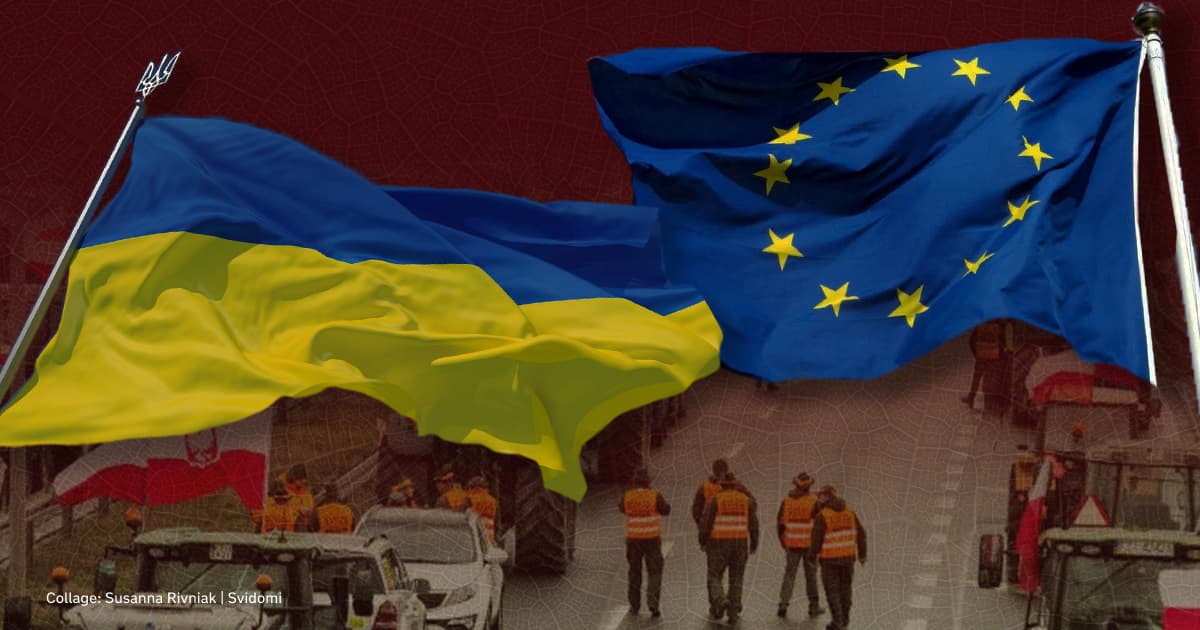
For example, on February 18, volunteer Nazar Smyk reported on his Facebook page that protesters at the border were not letting trucks for “artillerymen to quickly unload ammunition at the position” pass through. The situation was resolved only by Polish customs officers, who manually transported the lorry with the trucks the next day past the only queue. Nazar Smyk said they did it “quietly to avoid an even bigger scandal”. On March 3, the blockade of trucks for the armed forces was repeated, according to the volunteer, and because of the blockade of exit from Ukraine to Poland, volunteers could not pick up the necessary goods and bring them to Ukraine. The situation was resolved with the help of the Ukrainian Embassy in Poland, which requested the Polish police to convoy the volunteer cargo to the checkpoints on an individual basis.
On March 4, Prime Minister Denys Shmyhal said that Ukraine had not recorded a single case of blocking officially registered cargo, such as military or humanitarian support.
Ukraine's economy is also suffering from the border blockade. Deputy Minister of Agrarian Policy Taras Vysotskyi reported that not only agricultural products are exported and imported across the border, but also machinery, fuel, and other consumer goods. The delay leads to various consequences — from market shortages to production delays due to a shortage of raw materials and logistical problems due to a lack of fuel.
People's Deputy Yaroslav Zhelezniak told Ukrainska Pravda that due to the blockade, Ukraine lost eight billion in taxes in February from customs payments. In February, the Ukrainian authorities expected to receive over UAH 47 billion in payments to the state budget from customs duties but received only UAH 39.5 billion. “This is money that we can use for military needs,” the MP summed up the main issue of the border blockade.
The Ukrainian and Polish governments are in the process of negotiating on border crossing capacity and regulations. On February 22, Donald Tusk announced that he would meet with the Prime Minister of Ukraine on March 28 to discuss a solution to the border blockade. In March, the Polish prime minister also said that he would not “close the border with Ukraine”, as some protesters demanded.
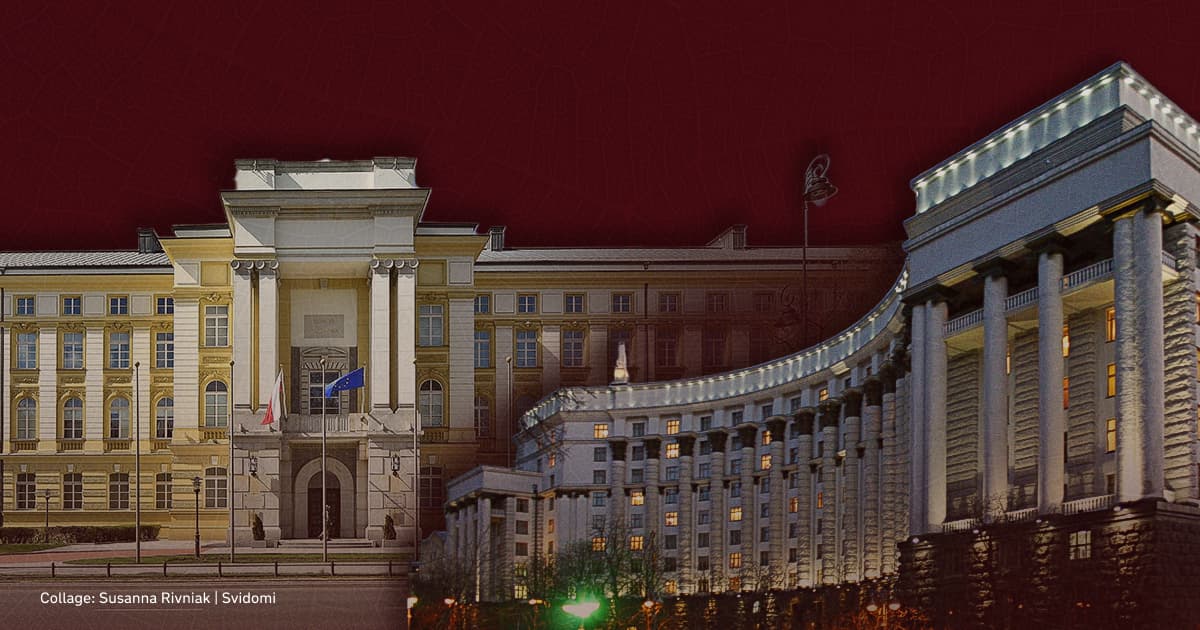
Meanwhile, the Ministry of Economy continues to negotiate with the Polish Ministry of Agriculture to reach a compromise that would satisfy the Polish government, Ukraine and the Polish protesters. Taras Kachka, a trade official at the Economy Ministry, does not reveal details of the future agreement. However, "the option of closing the border was not mentioned during the entire four hours of negotiations. As Polish Prime Minister Donald Tusk clearly said, this would be a very painful decision for our economies.
Roman Matys, a Ukrainian economist and head of the Department for Investment Policy NGO, contends that the challenge of the border blockade is multifaceted, partly owing to Ukraine's robust agricultural sector, which surpasses that of many EU member states in scale and influence. Therefore, similar situations with attempts to limit Ukrainian exports of agricultural products by farmers or entire states may occur in the future.
“We will be perceived as a serious competitor on European markets, and Ukrainian farmers should be prepared that the pressure on them will not stop for a long time because everyone is afraid of a strong competitor and will use all possible methods to delay the moment of entering into direct competition for EU subsidies,” the economist says about the main problem in the perception of Ukrainian agribusiness in the European Union, especially in Poland.
However, Roman Matys believes that the border blockade situation can positively impact the agricultural segment in Ukraine, especially on the secondary market for agricultural processing.

“Against this backdrop, the need to deepen the processing of agricultural products is becoming more urgent. Suppose there is a demand for imported food products in Ukraine, primarily from Poland. In that case, the situation on the domestic consumption market does not meet consumer expectations, and there are great prospects for processing agricultural raw materials and creating value-added products. Therefore, amid these restrictions, blockages, etc., processing in Ukraine will grow, and this niche is now attracting investors' attention,”
concludes Matys.


